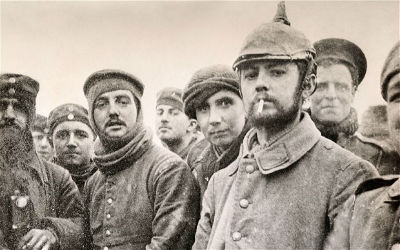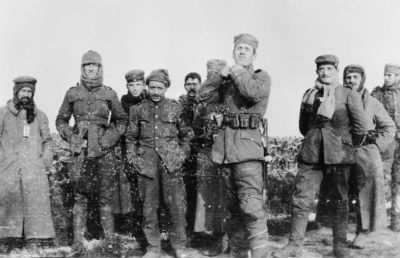The Song That Stopped a War
By Neil Earle
 Christmas cheer: soldiers of the 5th London Rifle
Brigade with German Saxon regimental troops during the truce at Ploegsteert.
Christmas cheer: soldiers of the 5th London Rifle
Brigade with German Saxon regimental troops during the truce at Ploegsteert.Christmas, 1914. The Western Front.
Along a sector of trenches manned by a Highland Brigade the tough Scots hear the words of a familiar tune wafting from the German lines: “Stille Nacht, Heilege Nacht.”
“Silent Night, Holy Night.” The Fritzes were serenading the Porridge Eaters with “Silent Night,” perhaps the most endearing and poignant of Christmas carols.
Cautiously, the Highlanders poked their heads above the barbed wire. They couldn’t believe what they were seeing. German soldiers had placed small Christmas trees and candles outside their trenches. Signs appeared in fractured English in the Gothic German script. “You no fight, we no fight.”
Slowly at first, some men left their trenches, half in disbelief. Soon small parties and then whole squads quickly formed in the Wasteland called No Man’s Land. German chocolate cake, cognac, postcards, French newspapers, British bully beef (a rare delicacy), Virginia Slims – all were exchanged. In a few places German and British soldiers actually played soccer (“Germany 3/British 2” read the official record of the 133rd Saxon Regiment). But first both sides buried their hallowed dead who had been rotting along the front.
Frank Richards recorded for BBC History magazine his view of 150 British and Germans gathered in one cluster and 6 or 7 other clumps of men all along the line in front of the 8th Division. In the Vosges Mountains to the South, a young German soldier named Richard Schirrman was so inspired by a similar event with French troops that, after the war, he founded the German Youth Hostel Association in 1919.
Peace on earth, among men of good will.
For a brief few moments the spirit of Luke 2:14 transformed a tiny part of the worst war men had yet seen. It didn’t last long, although some accounts say the spontaneous fraternization went on into the New Year filling out the Twelve Days of Christmas. Frederick Niven, a Scottish poet, wrote of this event. It was titled “A Carol from Flanders.”
O ye who read this truthful rime,
From Flanders, kneel and say:
God speed the time when every day,
Shall be as Christmas Day.
The Strangest Christmas
8½ million dead and 21 million wounded. This would be the final tally of the Great War, World War One, 1914-1918. The strangest Christmas celebration ever recorded was a will of the wisp. Officers and generals made sure it didn’t happen the next year, but then, the story goes, generals die in bed, soldiers die where they fall. On November 21, 2005, Alfred Anderson, the last British witness to the Christmas Truce did die in bed, in Newtyle, Scotland at age 105. But the story of that stark and beautiful Silent Night has gathered force and lives on as a testimony to the power of the simple Gospel Story. In 2005 the French film celebrating the Christmas Truce, “Joyeux Noel,” won the Best Foreign Language Film at the 78th Academy Awards.
Even today we are haunted by soldiers celebrating Christmas. A few years ago it was more than a little touching to see CNN’s live images of our bulked-up sons and daughters leaning their machine guns against an ancient mud-brick wall outside Baghdad or Tikrit or Kandahar. They were singing “Silent Night,” of course, trying to enjoy some special Christmas turkey along with their K-rations, trying for sure to channel some fleeting memory of the season, of home and peace and special faces.
Thus have soldiers of all ages learned to cope. And cope rhymes with hope, a word that embodies part of the spirit of the season we are in.
In what Paul Fuessel called “the Troglodyte World” of the Western Front with its rats, corpses and incessant noise, that universe of mud out of which were carved 25,000 miles of trenches – enough to circle the earth – war served as the potent backdrop for the re-presentation of Joseph Mohr and Franz Gruber’s masterpiece:
Sleep in heavenly peace, Sleep in heavenly peace.
 German soldiers of the 134th Saxon Regiment and
British soldiers of the Royal Warwickshire Regiment meet in no man's land, December
26.
German soldiers of the 134th Saxon Regiment and
British soldiers of the Royal Warwickshire Regiment meet in no man's land, December
26.Peace – heavenly peace, the message that makes the Christmas Truce of 1914 so newsworthy and timeless and that takes on more import as the names of the great generals fade into the dust. Jesus is called the Prince of Peace, he taught “Blessed the peacemakers,” and brought the Gospel of Peace (Ephesians 6:15). So the good news of Christmas and its strange power to silence the guns along the Western Front is also a living and perpetual challenge to us today. How can we live out the meaning of the season? What can we, small individual cogs in a machine that seems programmed for regularly recurring wars, what can we do to bring about peace?
Peace Begins Here
Of course part of the answer is to begin right where we are, in the midst of our human weakness. Christians represent a Kingdom that exists in this world in great weakness – a baby born of a virgin. But this Kingdom will eventually be the last one standing. “Of his kingdom there shall be no end” it says in Luke 1:33. We ambassadors of that Kingdom, we first need to grasp that the opportunities are right there before us, right where we live, on our block, in our complex, in our communities. We may feel as insignificant as grains of mustard seed but we are to be the living seeds of the Kingdom (Matthew 13:38).
How do we practice peace as ambassadors of peace, emissaries of another Kingdom? For a start we must begin with us. Most of us work so let’s start right there. A new book by Arthur Bell and Dale Smith titled Difficult People at Work: How to Cope, How to Win reminds us it is people who fight. It’s people who disturb our peace, and people we must learn to get along with. Jesus said the greatest in His kingdom is the slave of all – the Upside Down Kingdom (Mark 10:34). The apostle Paul said he was called to be all things to all men (1 Corinthians 9:22). That’s tough. He goes on: Romans 15:1 says, “We who are strong ought to bear with the scruples of the weak and not to please ourselves”
As we all know, there are plenty of books and courses and articles dealing with the fine art of getting along and “handling” the people who seem determined to ruin our peace. Since individual people and attitudes mainly determine the culture of a team, a corporation, a group, then its’ incumbent upon serious peacemakers to seek out some of these wise strategies and techniques in the year ahead. This pleases the Prince of Peace who said we were to be as wise as serpents, yet harmless as doves (Matthew 10:16).
Secondly, why not resolve to become a better world citizen in the next year? ISIS, the Ukraine, Iraq, Ferguson, Missouri – the world seems to be in a shambles. Yet those French soldiers, British Tommies and German peacemakers of 1914 hold up a high standard for all of us. Amid the living crucifixion of the greatest war till then they reminded us that there is just one race, the human race. Thus the more we learn about another culture, another ethnic group, another part of the word, perhaps the better for all of us.
One teacher testified that after reading The Life of Frederic Douglass, Escaped Slave he was never able to view black people the same way again. This is called G-R-O-W-T-H! It just may be that your voice around the family table, at city council, in the board meeting or at “happy hour” can make the difference in turning suspicion into acceptance: “Now wait a minute, I know this man Rashid. I’ve met his family. I’ve learned a few things about his culture. You can’t say all ________ are like that.”
Fill in the blanks.
The events of Bethlehem – pregnant girl on 70 mile trip, no room at the inn, a manger for a bed – these remind us of how the Kingdom comes in great weakness. All we are asked to do is light with our attitudes fragile candles of hope lit against the encircling gloom. We cannot change the world, possibly, but we can make a difference right where we are. Such is the way of the Kingdom of God as it advances one mustard seed at a time. In the end it is the only Kingdom that can last. “To become the change we want to see in the world.” That’s not a bad motto, actually, for now and for every time of year.
Merry Christmas and a truly peaceful and prosperous New Year from the New Covenant Fellowship of Glendora.
A Heavenly Accident
The story behind “Silent Night” involves the acting out of one of the Bible’s most encouraging passages, Romans 8:28, “In all things God is working for the good.”
Secluded in the Austrian Alps is the little town of Oberndorf. As Christmas drew near in 1818, the assistant parish priest, Father Mohr, was far from happy. His organist Franz Gruber had told him the pipe organ at the Church of St. Nicholas was broken. It would not be ready for Christmas Mass.
Deeply sad, the little priest walked through the town to cheer himself up. As he saw the simple but faithful people making their Christmas preparations his spirits lifted a little. Entering the house of a poor laboring family where a child had just been born, his priestly imagination was stirred at how close this birth event fit the Bethlehem story. Mohr returned to his church and penned four stanzas in a rush of quiet enthusiasm:
“Round yon virgin mother and child, holy infant
so tender and mild/
Sleep in heavenly peace, sleep in heavenly peace.”
When Gruber next appeared Mohr handed him the four verses and rustled up a guitar from the nearby room. Over Gruber’s protests a new song took shape – peaceful, calming and melodic. That midnight at mass the new carol was sung for the first time.
When the repairmen came to fix the organ early in 1819 Gruber played the new song. Repairman Karl Mauracher loved it right away and recommended it to the four Strasser children, a valley troupe who “sang like nightingales.” When they later performed it at the Leipzig fair it was heard by the Director General of Music of the Kingdom of Saxony. He knew a good thing when he heard it and arranged for a royal performance. When the Strassers performed it for the King and Queen of Saxony on Christmas Eve, 1832 the new song took wing. One of the sweetest Christmas carols was on its way around the world.
(From Living Stories of Famous Hymns by Ernest K. Emurian)